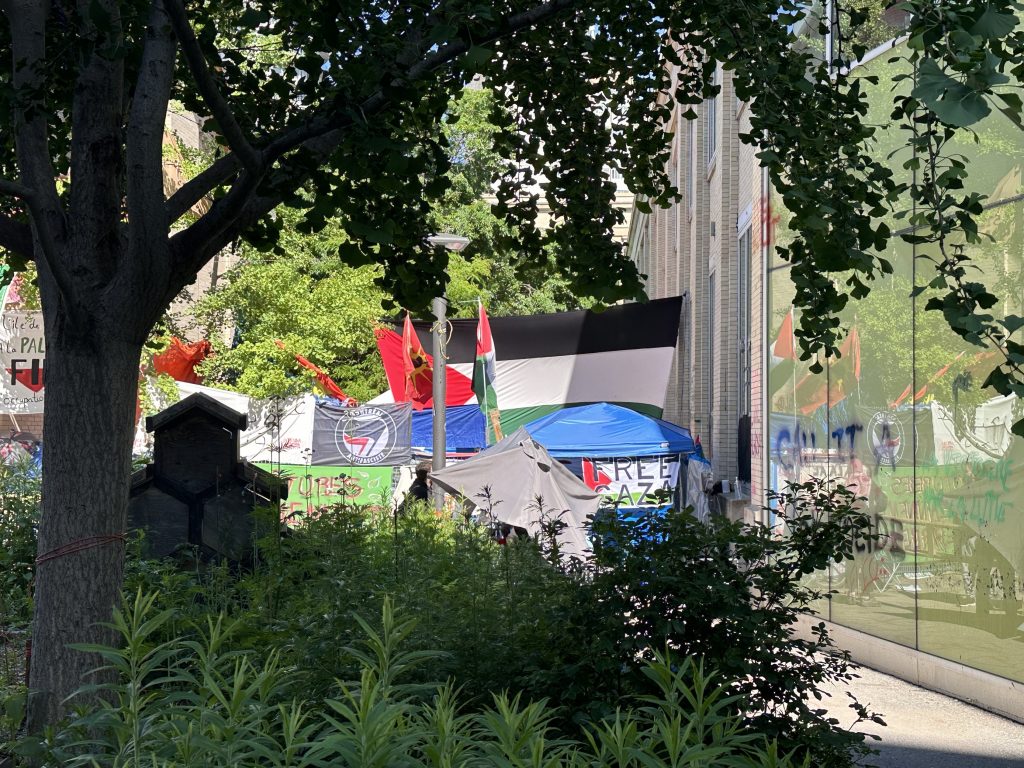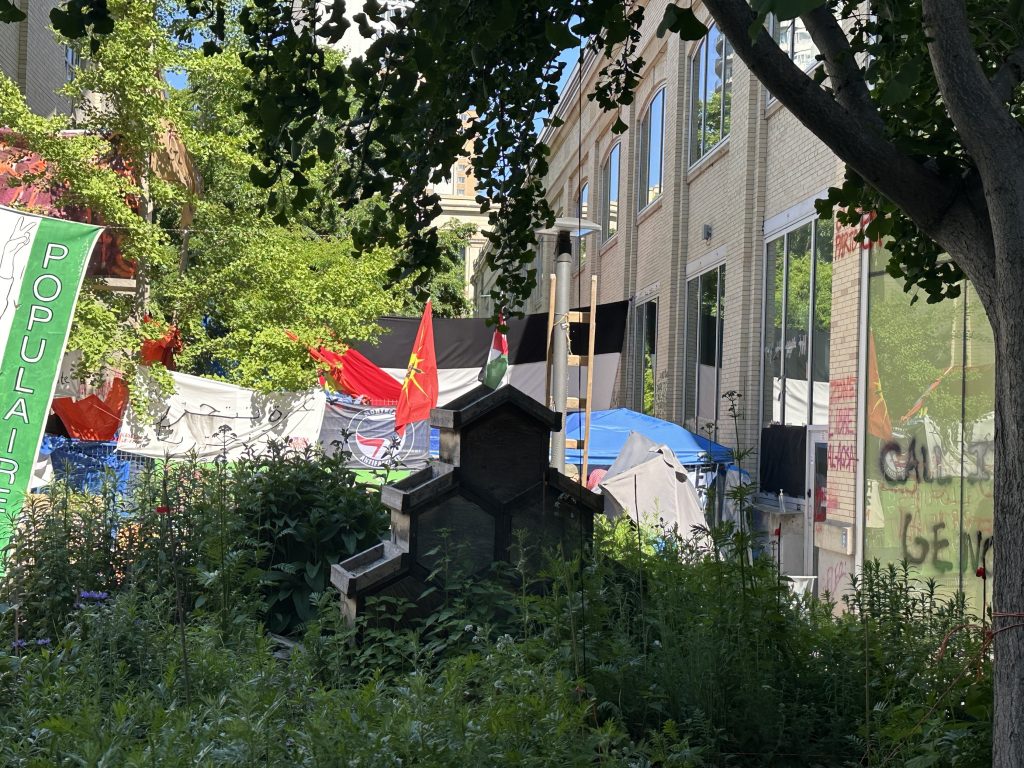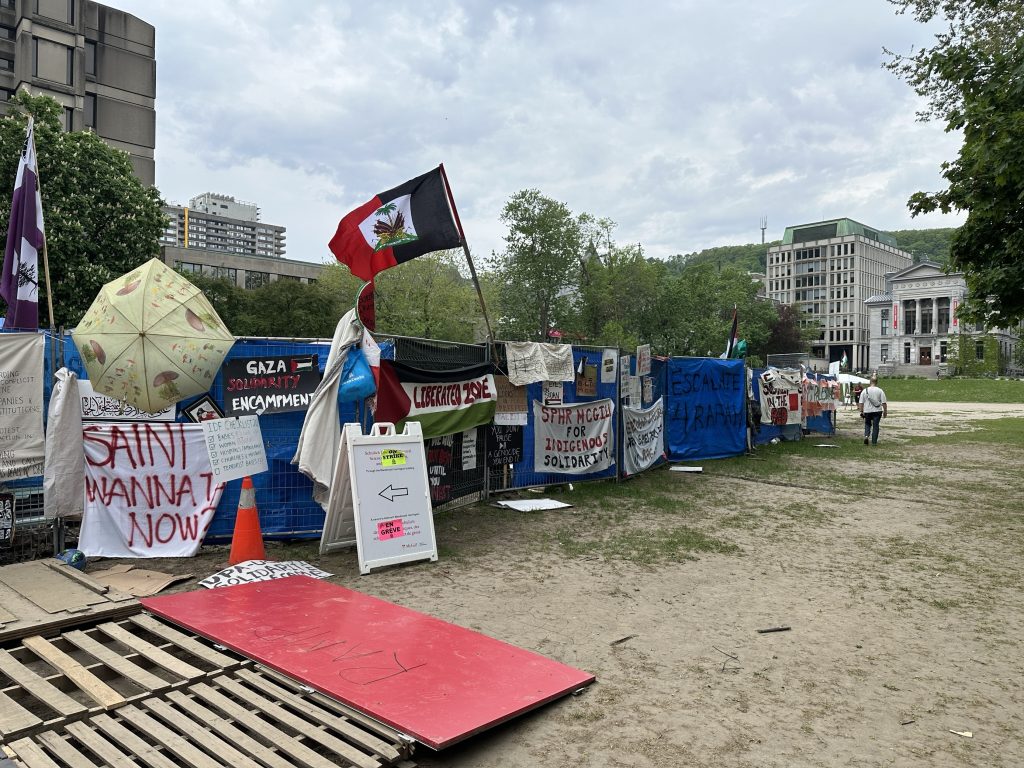After three weeks of protesting, the Université du Québec à Montréal (UQAM) encampment is set to come down – with demonstrators said to be “satisfied” that there demands have been met.
A representative of the camp confirmed the information to Radio-Canada on Thursday morning.
This comes after UQAM’s board of trustees adopted a resolution on Wednesday night condemning “the grave violation of fundamental human rights and the loss of civilian life in Palestine and Israel” – and called for an “immediate ceasefire” in the Israel-Hamas war.

La Presse reports that the university pledged not to hold any assets in funds or companies profiting from armaments, and to disclose their list of investments each year.
It will also ensure that none of its current or future academic agreements conflict with the principles of peace and international humanitarian law.
UQAM maintains that they hold no ties with Israeli educational institutions.
The encampment members are set to hold a press conference this morning.
The tents had been setup on May 12 in the inner courtyard of the Complexe des sciences Pierre-Dansereau, two weeks after the first pro-Palestinian encampment appeared at McGill University.

On Monday, a Superior Court judge authorized UQAM’s request for a partial injunction.
The ruling required occupants to remove all obstructions to doors, windows and security cameras, and to clear a two-metre space alongside the buildings to create a circulation corridor.
McGill wants police to be more present
McGill President and Vice-Chancellor Deep Saini is asking Montreal police (SPVM) to be more present amid rising tension and intimidation on campus.
In an open letter published Wednesday, Saini said that although violence in the Middle East is “devastating,” intimidation, harassment and discrimination is not acceptable on campus.
“Masked demonstrators have targeted personal residences of senior administrators on more than one occasion,” wrote Saini. “At one such event, the protesters stayed for hours, using amplified megaphones to yell “you can’t hide” and other intimidating slogans.”
McGill’s president claims that they’ve met multiple times with the McGill students representing the encampment and presented offers, but both parties remain in disagreement.
The encampment has been set up since April 27, and protesters have been calling on the university to divest from companies linked to Israel and to cut ties with Israeli institutions.
An emergency injunction to dismantle the camp was rejected on May 15.

Saini said that on Sunday evening, protesters hung an effigy of Israel’s Prime Minister dressed in a striped outfit that resembled a prison uniform; or outfits that Jews and other marginalized people wore in concentration camps during the Holocaust.
He claims the situation is past peaceful protesting, and the graffiti around campus borderlines “discriminatory speech.”
“A senior administrator was followed and harassed by masked individuals emerging from the encampment. The offices of one McGill team were also targeted. A table was set with rotted food next to a sign that named each team member with red handprints painted to look like blood. A sign posted stated ‘Food You Deserve,’” he explained.
Two provisional injunction requests were filed to have the protesters removed from campus but were rejected by Quebec Superior Court justices.
The university will return to court this summer to get the encampment dismantled.
The president noted that McGill has offered three solutions to move forward with the activists, but no agreements have been made.
“We have offered to examine divestment from companies whose revenues largely come from weapons, to increase McGill’s links to scholars and institutions in Gaza and the West Bank, and provide urgent support to displaced students and scholars,” he wrote. “We would extend McGill’s transparency in our investment reporting by publicly listing the companies in which we have equity holdings under $500,000, where that is permitted.”
Saini concluded that divesting on geopolitical issues will divide others rather than unite them.
“Experience has taught us that maintaining a neutral institutional stance best supports as a whole our 50,000 members who hold varied political views, represent diverse identities, origins, and beliefs, and ardently espouse various causes.”